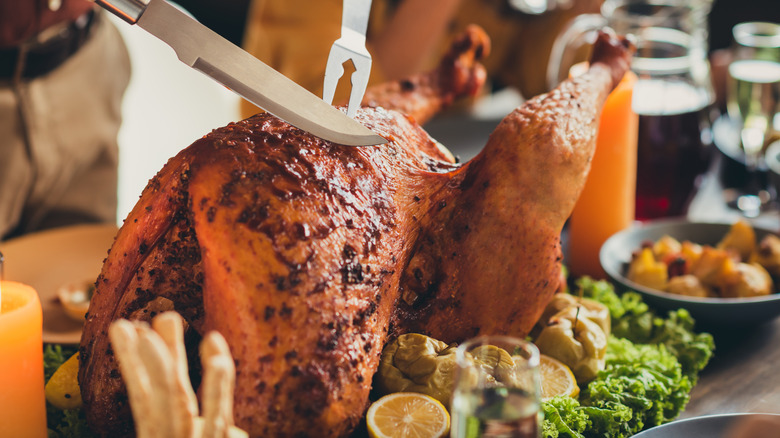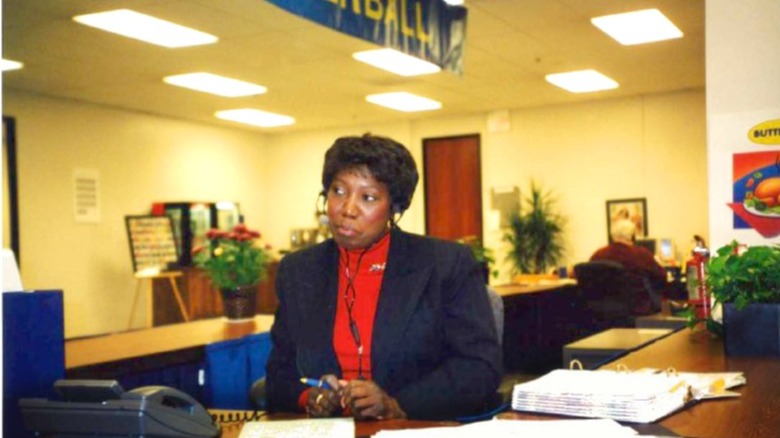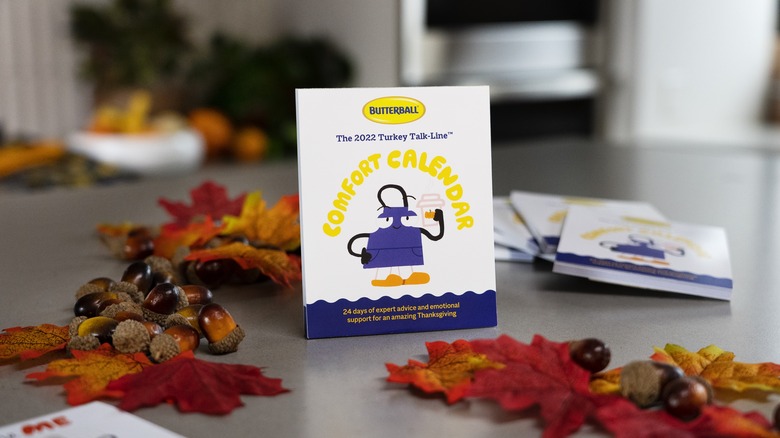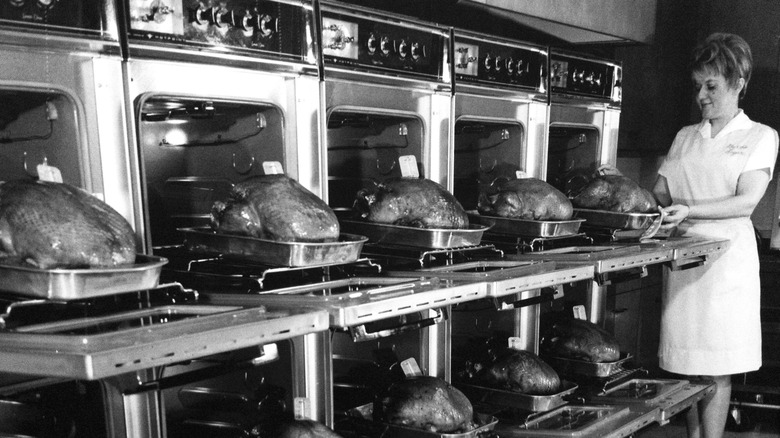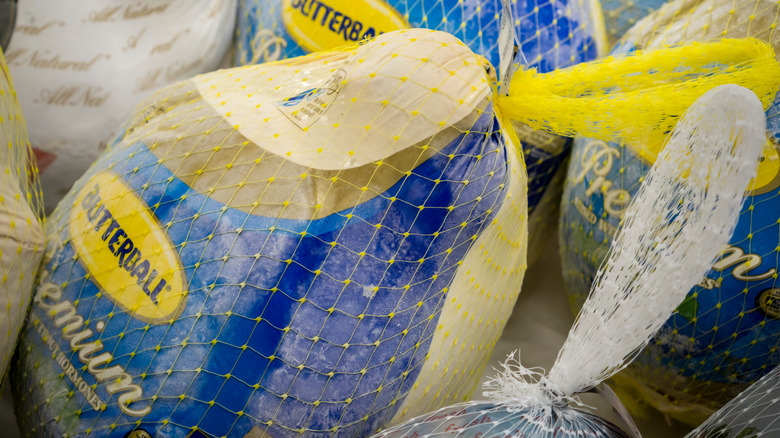A Butterball Turkey Talk-Line Expert Explains What You Need To Know Before Thanksgiving - Exclusive Interview
Every year, thousands of home cooks find themselves in charge of cooking the family turkey on Thanksgiving, and every year, thousands of home cooks find themselves struggling with the assignment. Cooking a turkey is rarely an easy feat, especially considering the majority of home cooks only practice their turkey-cooking skills maybe once or twice per year, at most. Luckily, Butterball is here to help — and has been for decades.
In 1981, Butterball launched its Butterball Turkey Talk-Line, allowing home cooks to call in leading up to and on Thanksgiving with their most pressing questions about how to best thaw, cook, and store their turkeys. Today, that Talk-Line still exists, but you have more ways than ever to get your questions answered, via chat, text, email, and still, of course, an old-fashioned phone call.
Andrea Balitewicz is a Butterball Turkey Talk-Line supervisor with an impressive resume to back up her turkey know-how. Previously, she's worked in recipe development for Pampered Chef, in the test kitchens at Kraft Foods, and with marketing teams at household name brands such as Kraft Macaroni and Cheese and Jell-O. She's been working as a Turkey Talk-Line expert for seven years this season, so Mashed recently caught up with her to learn more about the Turkey Talk-Line, her top tips for roasting a turkey, and Butterball's latest offering for stressed home cooks, the Turkey Talk-Line Comfort Calendar.
Behind the scenes at the Butterball Turkey Talk-Line
You have a ton of experience in food, and you've worked as a Butterball Turkey Talk-Line expert for several years now. How did you become a Butterball Turkey Talk-Line expert? Why is that something that you wanted to do?
Yes, I've had a lot of cooking experience. A lot of my time was spent doing recipe development [and] some product testing. I decided to stay home when I had my children. I was doing some consulting work, and a girlfriend told me about the Butterball Turkey Talk-Line. It intrigued me right away because, through all these years of the cooking that I've been doing [and] the recipe testing, I've always had girlfriends that call me or I always have family that are calling me for advice. I have neighbors that run over at the last minute and need a thermometer. So it was something that I was already doing — talking to people, providing them some support, giving them cooking advice all along — and I absolutely love that. I enjoy talking about food. I enjoy helping other people, and this was something that I was so interested in.
When I joined the Butterball Turkey Talk-Line, it couldn't have been better. We're a staff of 50-plus food professionals, and there's so much knowledge within our team. It's like nirvana. We all click together. There's so much to talk about, and there's so much knowledge. We have chefs. We have registered dietitians. We have food professionals and culinary professionals, like myself. It's a great group to be with, with so much knowledge.
The staff's tenure is amazing. We have staff that have been there 20 or 30 years. They keep coming back year after year. It's almost like a family reunion now.
What does that look like when you're actually working with the Talk-Line? Are you sitting at home in front of your computer answering questions?
We have a location in Naperville, [Illinois]. It's our call center for the Butterball Turkey Talk-Line. We have rows of computers, and we all have our headsets. When the staff comes in for their shift, they each have a spot to sit. It's great because people will line up next to their friends or next to the people they know. Sometimes, they'll put a consumer on hold and ask someone else a question, just to get a little reassurance or some advice from a neighbor.
We're [working] in the office; 2020 was the first year we actually did some remote work, but we love being in the office so we can share those stories and share ideas as we're talking to our consumers.
Is it set up like a typical office job, where you come in for eight hours and work your shift?
Yes. We provide our availability to our boss, and she sets up a schedule. There are anywhere between four- and eight-hour shifts. Definitely, the week of Thanksgiving, it's fully hands-on. Everybody's there. Everybody has an eight-hour shift. The most exciting part of our job is Thanksgiving week, so we all want to be there.
Your top turkey questions
What are some of the most common questions that you hear from people who call in to the Turkey Talk-Line?
Year after year, the number-one question is how long to thaw your turkey. When we do our staff training, we spend a ton of time talking about how to tell consumers how to thaw a turkey. They don't realize that it takes so long because typically, people are not thawing that large of a piece of meat. The formula is one full day will thaw every 4 pounds of turkey. So if you have a 20-pound turkey, it could take five days to thaw in your refrigerator. [In response], we have what we have termed "National Thaw Your Turkey Day." It's the Thursday before Thanksgiving. This year, it's November 17, and it's listed on our Butterball Turkey Talk-Line Comfort Calendars.
Then, there are lots of questions around mistakes that people have made when it comes to thawing. You definitely have people calling at that last minute. They'll say, "Oh my gosh, I completely forgot to thaw my turkey, and Thanksgiving is tomorrow." Or they call on the day of. We have some tips, and we always provide them with some solutions.
For someone who [is] ahead of the game and [has] successfully thawed their turkey, should [they] really only leave [their] thawed turkey in the fridge for a certain amount of time once it's thawed?
Yes, absolutely — four days. Once the turkey is completely thawed, the meat is good for four days, and then they have to cook it.
What are some of the weirder or more unusual questions that you've gotten over the years?
It's all common mistakes, where they've left the turkey maybe in the garage because there was so much excitement when they were bringing home all these groceries, and everybody went out to help, but the turkey was so heavy that they put it down, and then days later, they find the turkey in the garage or in the car.
Those are some of the odd questions. The turkeys are everywhere. They're outside. They're placed all over the place when people are rushed or excited or in a panic. Those are the unique questions where we have to then determine, is that turkey going to be safe for them? And Butterball is always going to err on the side of food safety. If the turkey has not been held properly, we will tell them that it's best to discard the turkey.
Have you ever gotten a question that's stumped you?
Oh, sure. There are all kinds of questions about [storing] the turkey certain ways. They'll say that maybe their refrigerator was on, but then they lost power and they're not sure of the temperature. It always gets a little tricky.
So it's great that we have a very knowledgeable staff. I can say, "You know what? I just want to talk this over with one of my colleagues." And again, we always err on the side of food safety. But like I said, they come up with all different ways that they've been holding their turkey, and they do stump you sometimes.
A little reassurance in the kitchen
Tell me a little bit more about the Comfort Calendars.
The Butterball Turkey Talk-Line has been open since 1981. We started with six professionals answering phone calls, and they had a Rolodex of topics and questions and answers. That first year, they answered 11,000 calls. Forty-plus years later, we're still getting calls about how to prepare turkey, but we also provide emotional support. It's like calling up your best friend. With that emotional support, we're always giving them tricks. We're giving them hints. We're giving them hacks. Sometimes, people call us back year after year, and they say they just want to get that reassurance from the Butterball Turkey Talk-Line.
This year, we are turning that into 24 days of emotional support with our Butterball Turkey Talk-Line Comfort Calendars. We're super excited about this. It's really cute. It's fun. The little icon [on the calendars] is [designed] after our little Butterball aprons. It's very iconic and very playful.
[The calendar] talks about having some me time. It talks about planning ahead. We have our National Thaw Your Turkey Day listed on November 17. We're giving some tips and we're giving some hints. We're providing that emotional support with the calendars.
The way that people can get the calendars is, we have a website called ButterballComfortGiveaway.com, and they can enter to claim one of the calendars between October 24 and 26.
Do you find that a lot of people who call in could probably cook their turkey on their own, but what they really need is that reassurance and someone to tell them that it's going to be okay?
Absolutely. That's the whole reason they're calling. They sometimes want to talk it through, or they want to maybe settle a dispute — "I told my mother-in-law that I was right." They need that reassurance and a little bit of emotional support to get them through the holidays.
Top turkey tips
Beyond making sure that you thaw your turkey appropriately, are there any other top tips that you have for home cooks this season?
Your best friend besides the Butterball Turkey Talk-Line on Thanksgiving Day is a meat thermometer. That's the only accurate way to know that your turkey is fully cooked — to take the temperature with the meat thermometer.
People will call [the Talk-Line] and say, "Can't I just wiggle the leg? That's what grandma did." Or, "It looks done!" But you definitely have to take the temperature.
Butterball recommends [cooking your turkey until it reaches] 170 degrees Fahrenheit in the breast and 180 degrees in the thigh. If you were to stuff the turkey, the stuffing has to reach 165 degrees Fahrenheit. Then we know that the turkey is safe and ready to go.
Do you have a recommended meat thermometer?
You just want to make sure your thermometer is accurate. A lot of times, the older thermometers can get a little bit off in their calibration. So if you have that, that's completely fine. What we recommend is to test the thermometer by using an ice-water bath. You fill up a glass container, or any cup, full of ice, and then you fill it with water to the top of the ice, and then you place the thermometer in to calibrate it and see the temperature. You want to make sure you have something accurate.
Of course, the newer digital thermometers are instant. So within seconds, they give you that temperature reading. They're more accurate and instantaneous. They're all over the grocery store now, in the areas where the turkey pans are. The stuffing, the bags, and the thermometers are all there. It's like one-stop shopping, and then, the turkeys are usually right next door to them. So if they can pick up a new thermometer — if they have any questions about their old thermometer — that probably would be best.
Are there any other top mistakes that you see people make that they could avoid if they planned ahead or did something differently?
If people plan ahead, they make less mistakes.
They need to make sure that they plan that extra time for thawing. They need to know how long [the turkey is] going to cook, and if they keep opening up the oven door and letting out the precious heat to check on the turkey or to peek at it because everybody wants to see how it's doing, they're going to extend that cooking time.
Also, I swear by letting the turkey rest. I always plan to have my turkey out at least an hour before I want to eat. You want to let it rest 20 to 30 minutes, at least, as that allows the juices to redistribute throughout the meat. It makes it so much easier to carve. The slices are beautiful. If you [slice] it right away, when it's so hot and steamy, the meat tends to shred and fall apart.
I take it out an hour before we want to eat, provided it's done with the thermometer. I cover it with foil and then clean dish towels. That'll insulate it and hold in that heat, giving you resting time, and then you have to have time to carve. People are not used to carving a turkey. It takes a few minutes for the average cook to get it to the table. So it really does take that full hour once it comes out of the oven.
How the expert cooks her turkey at home
What is your preferred personal method for making a turkey if you're going to make one for your family on Thanksgiving?
I've made lots of turkeys, and I've made turkeys lots of different ways. I don't have a convection oven, but my mom does. So I like to prepare the turkey at home, and then I'll transport it to her house and cook in her oven because I feel like her oven is better. That convection oven makes such a beautiful, golden-brown turkey and seals in the juices. It's absolutely delicious. I'm traditional. We've smoked a turkey, we've grilled a turkey, but I'm a traditionalist.
And it's nice to plan for some leftovers. I always like to make sure that I cut off the turkey and put it away so that you don't get sick of those leftovers. Then, you can plan it for another meal. I think that's important, too. My family will say that I'm the queen of leftovers or putting the meal aside to come up with another idea later on in the season. Butterball.com is loaded with great recipe ideas that will help any cook if they're looking to prepare an extra meal with the turkey meat.
How long should people keep their leftover turkey after Thanksgiving?
Three days. They should not be making that turkey sandwich for going back to work on Monday. Three days is best for leftover meat. If you think you want to do something in a couple of weeks, prepare a chili or make some enchiladas, something completely different with the turkey meat, it's best to store it and freeze it. It'll last a couple of months in the freezer.
The Butterball Turkey Talk-Line Comfort Calendars are available at ButterballComfortGiveaway.com from October 24 to 26. Watch out for additional Thanksgiving prep content on the Butterball Instagram channel, @ButterballTurkey.
You can also call the Butterball Turkey Talk-Line at 1-800-BUTTERBALL. The Talk-Line opens November 1 and is open through December 24.
This interview has been edited for clarity.
